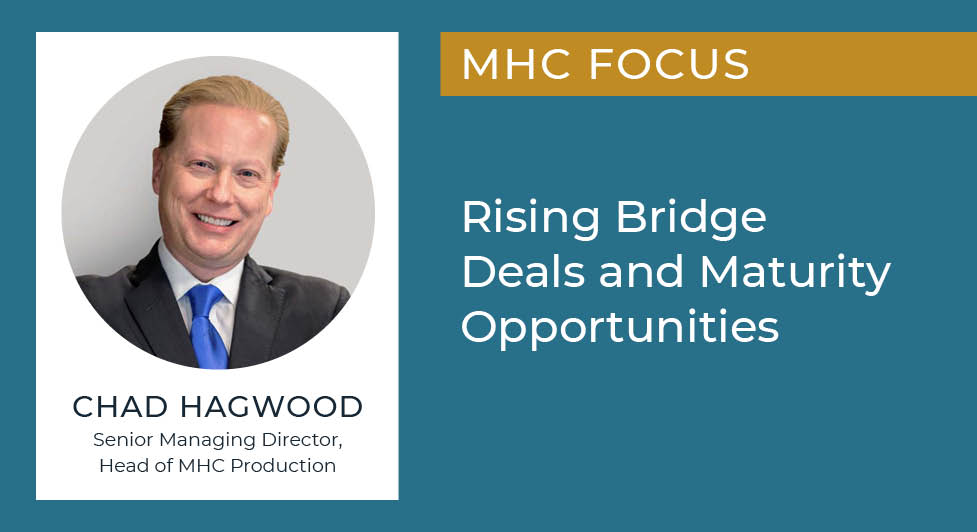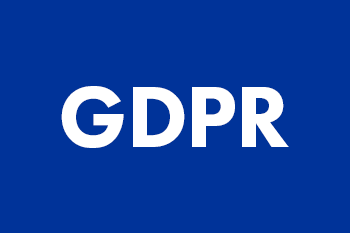This is part four of a six-part series on MHC insights and strategies by Chad Hagwood.
With manufactured housing (MHC) investment bustling and interest rates dramatically rising, many MHC sponsors need to make a key decision soon: Where to turn when their bridge loans mature.
Due to high market activity and record low interest rates prior to 2021, a large number of MHC investors locked in short-term financing for acquisitions, upgrades, and new developments. As a result, bridge loans on MHC investments have hit notably high volumes in recent years and many of those loans are now coming due.
While this is familiar territory for multifamily sponsors more broadly, it may be a first for the MHC market. The MHC market has grown exponentially in recent years. More than 110,000 new manufactured units shipped in the U.S. last year alone, according to U.S. Census data. At the same time, cap rates have come down and interest rates have gone up, putting some MHC borrowers in a tough predicament.
Given that most trusted lenders caution borrowers against bridge-to-bridge financing, which can lead to unmanaged financial risks, many MHC sponsors will need to explore other options. This includes securing permanent financing, finding new equity backers, and exploring potential investment sales in some cases.
Here’s a look at some of the more reliable financing options for MHC investors that need to transition from their short-term debt.
Bridge-to-Bridge: Red Flag
While bridge loans offer MHC and other multifamily sponsors a temporary means of financing acquisitions, construction, and other capital costs, they can also quickly become a band-aid solution to greater financing needs.
As short-term debt matures, especially when interest rates are on the rise, it can leave sponsors exposed to sudden spikes in debt costs and other financial risks.
Though it’s not inconceivable for MHC owners and operators to seek additional short-term financing when their bridge loans mature, borrowers should proceed with caution since going from bridge loan to bridge loan can be seen as a red flag.
In many cases, before their bridge loans mature, borrowers will need to secure permanent financing or a combination of new equity and debt.
Exploring New Equity Sources
In some worst cases, newer MHC buyers are learning that they may have paid a relatively high price for acquisitions, given the growing cost of debt and some are finding their business plans expectations were too lofty.
Undercapitalized borrowers coming up short on hitting their pro formas and financial targets should make sure they are ready to network. The Manufactured Housing Institute and other trade organizations have important conferences coming up this winter that might provide networking opportunities.
Today, there are a handful of viable equity options for MHC sponsors, including syndication and resyndication deals. Many family offices, investment funds, limited partners, and other equity providers are waiting on the sidelines with capital and looking to target the right deals for their portfolios.
Owners and operators with enough experience can often partner with outside investors looking to deploy capital on what many consider to be among the most recession-proof multifamily investments. By doing so, MHC sponsors can start to minimize the amount of short-term debt in their capital stacks.
Forming Trusted Lender Relationships
While MHC financing has become more widely accepted over the past decade, some lenders have a better understanding of and greater appetite for MHC investments than others.
There is a range of longer-term debt solutions for MHC borrowers that are nearing the end of their bridge loan terms. These debt products include financing through Fannie Mae and Freddie Mac, HUD, and FHA-insured loans, as well as conventional bank loans and commercial mortgage-backed securities.
Many of these loans start at $1 million and can reach up to $100 million with five- to 10-year fixed and floating-rate terms, amortization periods of 25 to 30 years, and maximum loan-to-value ratios of 75% to 80%. Interest rates on MHC mortgages vary and tend to be the lowest with agency and FHA/HUD loans.
With permanent financing, in most cases, the principal owner should have a solid track record and years of experience operating MHCs and a portfolio with more than one property.
Partnering with an experienced MHC lender, such as Lument, can give borrowers a leg up in today’s highly competitive markets and challenging economic climate.


